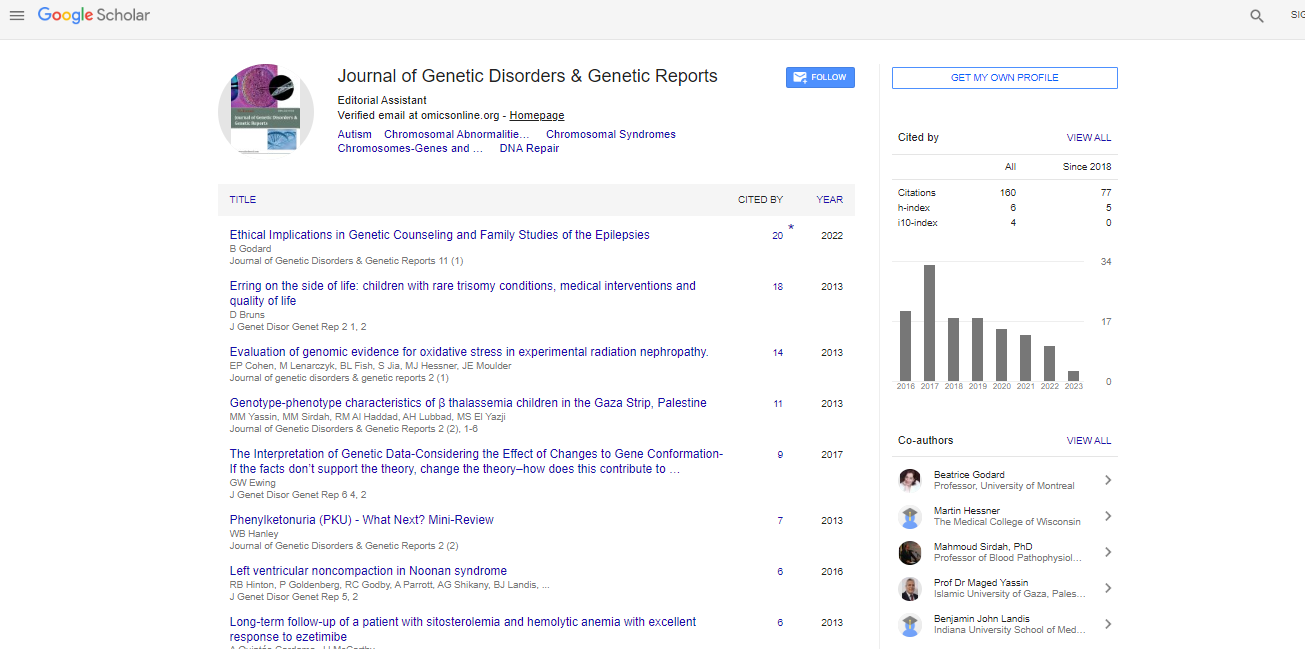Opinion Article, J Genet Disor Genet Rep Vol: 10 Issue: 11
Utilization of Customized Medication Incorporate Oncogenomics and Pharmacogenomics
Allen Stokes*
Department of Behavioural Genetics, University of British Columbia, Montreal, Canada
- Corresponding Author:
- Allen Stokes
Department of Behavioural Genetics, University of British Columbia, Montreal, Canada
E-mail : S_Allen@ged.mui.ac.ca
Received Date: 03 November, 2021; Accepted Date: 17 November, 2021; Published Date: 24 November, 2021
Keywords: Mutations & Functional Consequences, Chromosomes, Genes and DNA variations, Environmental genetics, Population Genetics and Evolution
Description
Customized medication is a clinical strategy that objectives treatment structures and therapeutic choices in view of a patient's anticipated reaction or hazard of infection. The National Cancer Institute [NCI], an arm of the National Institutes of Health [NIH], records a patient's qualities, proteins, and climate as the essential elements examined to forestall, analyze, and treat illness through customized medication.
There are different subcategories of the idea of customized medication, for example, prescient medication, accuracy medication and delineated medication. Albeit these terms are utilized reciprocally to depict this training, each conveys individual subtleties. Prescient medication depicts the field of medication that uses data, frequently acquired through private genomics procedures, to both anticipate the chance of illness, and establishment deterrent measures for a specific person. Accuracy medication is a term basically the same as customized medication in that it centers around a patient's qualities, climate, and way of life; in any case, it is used by National Research Council [NRC] to keep away from any disarray or misinterpretations related with the more extensive term. Defined medication is a rendition of customized medication which centers around separating patients into subgroups in view of explicit reactions to treatment, and recognizing successful medicines for the specific gathering. Instances of the utilization of customized medication incorporate oncogenomics and pharmacogenomics[1-3].
Pharmacogenomics
Oncogenomics is a field of study zeroed in on the portrayal of disease related qualities. With disease, explicit data about a cancer is utilized to assist with making a customized conclusion and therapy plan. Pharmacogenomics is the investigation of what an individual's genome means for their reaction to drugs. This field is generally new however developing quick due partially to an expansion in subsidizing for the NIH pharmacogenomics research network. These treatment plans will actually want to forestall or possibly limit the unfriendly medication responses which are a, "critical reason for hospitalizations and passings in the United States." Overall, analysts accept pharmacogenomics will permit doctors to all the more likely designer medication to the requirements of the singular patient. As of November 2016, the FDA has supported 204 medications with pharmacokinetics data in its marking. These marks might depict genotype-explicit dosing directions and hazard for antagonistic occasions among other data.
Hereditary Illnesses
Sickness hazard might be determined in view of hereditary markers and genome-wide affiliation reads up for normal ailments, which are multifactorial and remember ecological parts for the appraisal. Sicknesses which are independently uncommon (under 200,000 individuals impacted in the USA) are all things considered on the whole normal (influencing about 8%-10% of the US populace). More than 2500 of these infections (counting a couple of more normal ones) have prescient hereditary qualities of adequately high clinical effect that they are suggested as clinical hereditary tests accessible for single qualities (and in entire genome sequencing) and developing at around 200 new hereditary illnesses each year[4].
Hereditary separation is segregating based on data acquired from a singular's genome. Hereditary non-segregation laws have been established in certain US states and at the government level, by the Genetic Information Nondiscrimination Act (GINA). [5] The GINA regulation forestalls segregation by wellbeing back up plans and bosses, yet doesn't have any significant bearing to extra security or long haul care protection. The section of the Affordable Care Act in 2010 fortified the GINA securities by restricting health care coverage organizations from denying inclusion as a result of patient's "previous conditions" and eliminating protection backers capacity to change charge costs in light of specific factors like hereditary sicknesses. Given the moral worries about pre-indicative hereditary testing of minors, all things considered, individual genomics will initially be applied to grown-ups who can give agree to go through such testing, despite the fact that genome sequencing is as of now demonstrating important for kids assuming any side effects are available.
There are likewise concerns in regards to human genome research in agricultural nations. The apparatuses for directing entire genome investigations are by and large found in big time salary countries, requiring associations among created and emerging nations to concentrate on the patients distressed with specific infections. The pertinent instruments for sharing admittance to the gathered information are not similarly open across low-pay countries and without a laid out norm for this kind of exploration, worries over decency to neighbourhood analysts stay agitated.
References
- Strausberg RL, Simpson AJG, Old LJ, Riggins GJ (2004) Oncogenomics and the development of new cancer therapies. Nature 429: 469â??474.
- Johnson JA (2016) Pharmacogenetics in clinical practice: How far have we come and where are we going. Pharmacogenomics 14: 835â??843.
- Corpas M, Valdivia-Granda W, Torres N, Greshake B, Coletta A, et al. (2015) Crowdsourced direct-to-consumer genomic analysis of a family quartet. BMC Genomics 16: 910.
- Gutmann A, Wagner JW (2013) Found Your DNA on the Web: Reconciling privacy and progress. Hastings Center Report 43: 15-18.
- Manuel C (2012) A family experience of personal genomics. J Genet Couns 21: 368-391.
 Spanish
Spanish  Chinese
Chinese  Russian
Russian  German
German  French
French  Japanese
Japanese  Portuguese
Portuguese  Hindi
Hindi 



